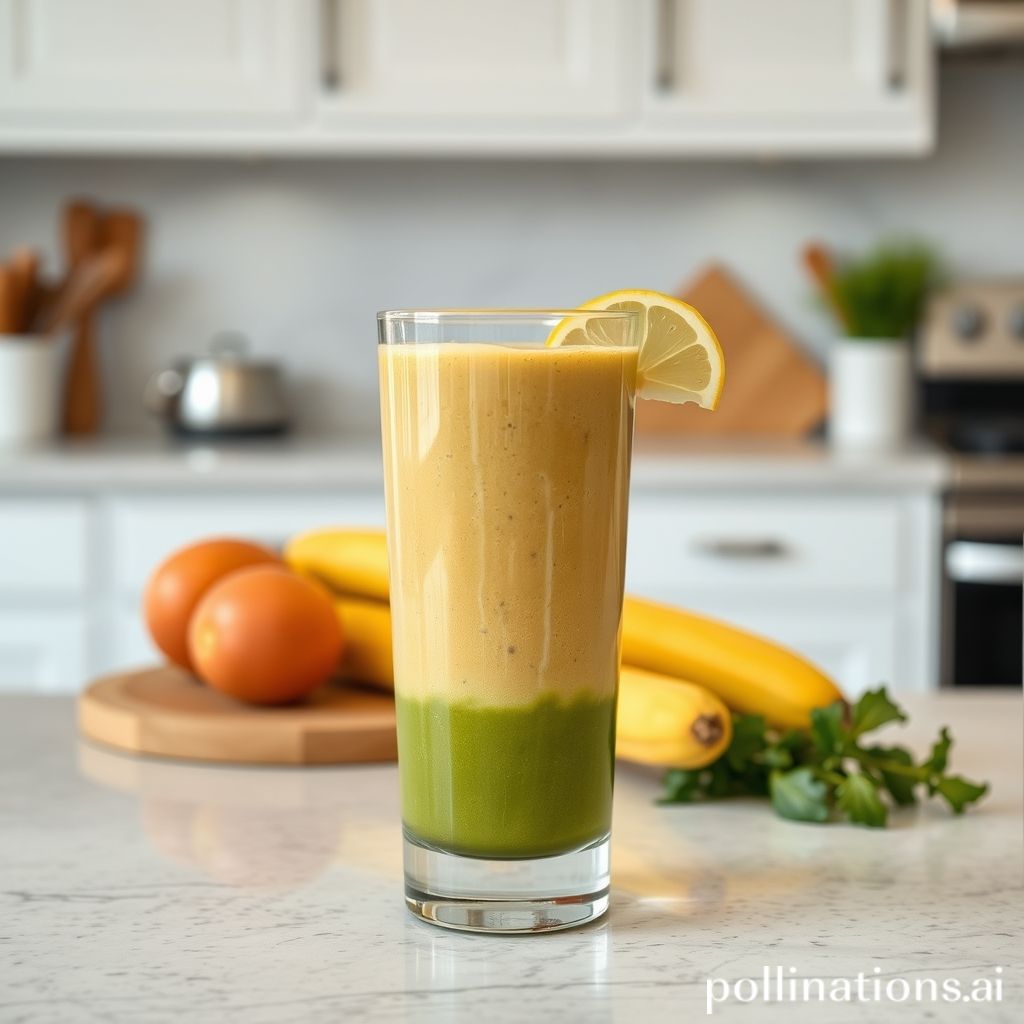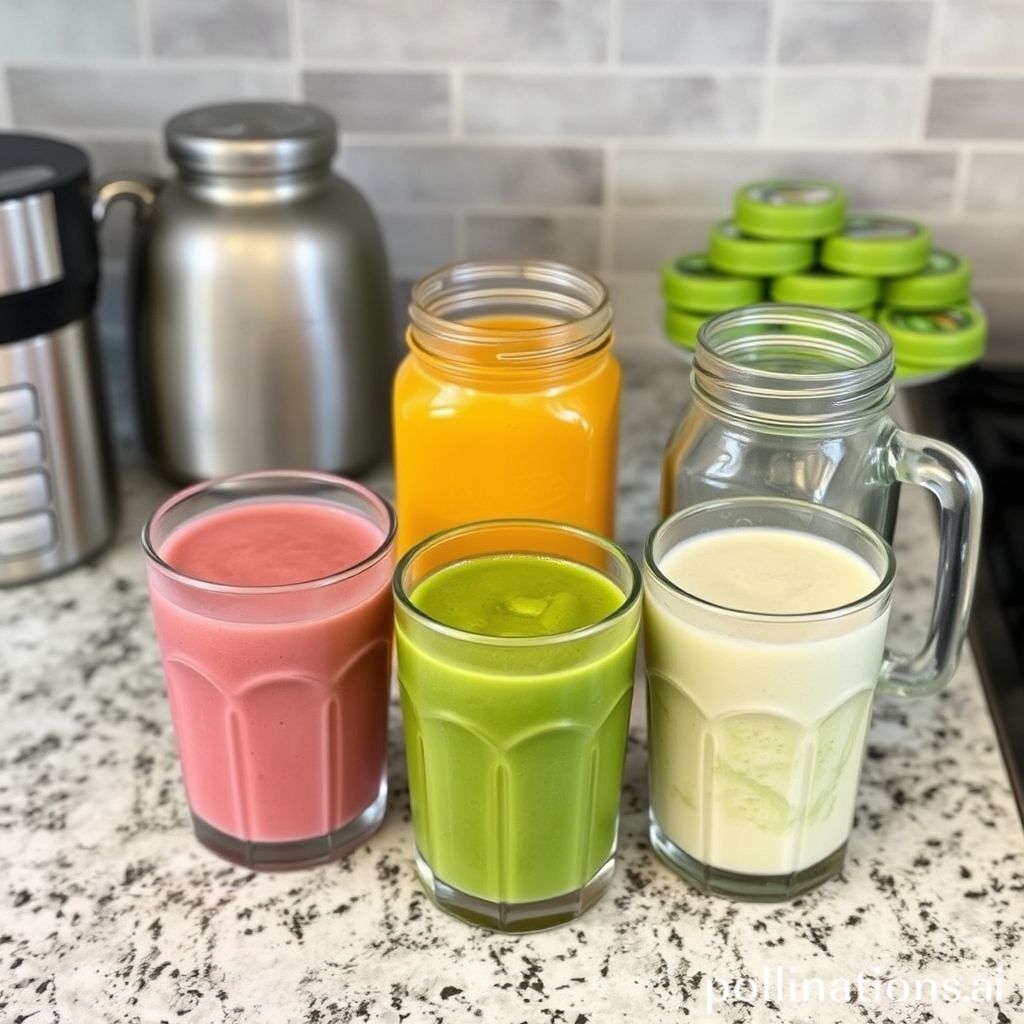Preserving Nutritional Value: Do Smoothies Lose Nutrients Overnight?
[su_note note_color=”#fb8e00″ text_color=”#000000″ radius=”12″]
Sipping on a refreshing smoothie is a fantastic way to nourish your body with essential nutrients. But what happens when you prepare a delicious smoothie the night before and store it in the refrigerator? Do smoothies lose nutrients overnight? This is a common question that health-conscious individuals often ponder.
The answer may surprise you. Whilst it is true that some nutrients can be lost over time, the overall impact is minimal. So, rest assured that your vibrant green smoothie will still provide a healthy dose of vitamins and minerals even after a night of rest in the fridge. Now, let’s dive into the science behind it and uncover the truth about nutrient loss in overnight smoothies.
[su_box title=”
[/su_box]

Mastering the Nutritional Value of Smoothies
1. Importance of Nutrients in Smoothies
Nutrients are crucial for maintaining a healthy body, and smoothies provide a convenient way to get a variety of nutrients in one drink. By Mastering the importance of nutrients in smoothies, you can make informed choices about storing and consuming them.
Smoothies are typically made with a combination of fruits, vegetables, dairy or non-dairy milk, and other nutritious ingredients. These ingredients contain essential vitamins, minerals, antioxidants, and fiber that support overall health and well-being.
When consumed fresh, smoothies have the highest nutrient content because the vitamins and minerals are at their peak. Notwithstanding, it’s important to note that the nutrient composition of smoothies can gradually change over time, especially when stored overnight.
2. Types of Nutrients in Smoothies
Smoothies are rich in various types of nutrients that contribute to their nutritional value. Common nutrients found in smoothies include:
| Nutrient | Function | Sources |
|---|---|---|
| Vitamins | Essential for various bodily functions, including immunity, energy production, and cell growth. | Fruits, vegetables, and fortified dairy or non-dairy milk. |
| Minerals | Needed for proper bodily functions, such as bone health, nerve signaling, and fluid balance. | Dark leafy greens, nuts, seeds, and dairy or non-dairy milk. |
| Antioxidants | Protect the body against damage caused by harmful molecules called free radicals. | Berries, citrus fruits, spinach, and other brightly colored fruits and vegetables. |
| Fiber | Aids digestion, promotes feelings of fullness, and helps regulate blood sugar levels. | Whole fruits, vegetables, and seeds. |
At the same time smoothies may lose some nutrient content when stored overnight, they still provide a significant amount of nutrients. They can be a convenient and delicious way to increase your daily intake of vitamins, minerals, antioxidants, and fiber.
[su_highlight background=”#f6b40f”]Expert Tips: Maximize the nutritional value of your smoothies by using fresh ingredients and consuming them soon after preparation.[/su_highlight]
Factors Affecting Nutrient Loss in Smoothies
1. Oxidation
Oxidation is one of the main factors that can lead to nutrient loss in smoothies. When fruits and vegetables are cut or blended, they come into contact with oxygen. This contact can cause the breakdown of certain nutrients, such as vitamin C. To minimize oxidation, it is recommended to consume a smoothie immediately after preparing it or store it in an airtight container to limit exposure to air.
2. Enzyme Activity
Enzymes naturally present in fruits and vegetables can also contribute to nutrient loss in smoothies. These enzymes can break down vitamins and minerals over time, especially when exposed to heat or changes in pH. To slow down enzyme activity, it is advisable to store smoothies at a cool temperature, such as in the refrigerator, and consume them within a day.
3. Exposure to Light and Air
Exposure to light and air can further accelerate nutrient degradation in smoothies. Certain vitamins, such as vitamin A and vitamin C, are particularly sensitive to light and can degrade when exposed to sunlight or fluorescent lighting. To minimize nutrient loss, it is recommended to store smoothies in opaque containers and consume them in a timely manner.
| Factors Affecting Nutrient Loss in Smoothies |
|---|
| 1. Oxidation |
| 2. Enzyme Activity |
| 3. Exposure to Light and Air |
Storing Smoothies Overnight
1. Refrigeration
Refrigeration is a commonly used method for storing smoothies overnight. By keeping your smoothie in the refrigerator, you can extend its shelf life and enjoy it the next day. Although, there are some considerations to keep in mind to ensure that your smoothie retains its nutritional value.
- Temperature: Store your smoothie at a temperature below 40°F (4°C) to slow down bacterial growth and preserve nutrients.
- Airtight Container: Use an airtight container to prevent exposure to air, which can cause oxidation and nutrient loss.
- Timing: Consume your refrigerated smoothie within 24 hours to minimize nutrient degradation.
2. Vacuum Sealing
Vacuum sealing is another option for storing smoothies overnight, providing an extra layer of protection against oxidation and nutrient loss. Here’s how you can effectively store your smoothies using this method:
- Blend and Prepare: Blend your smoothie ingredients as usual and ensure they are properly mixed.
- Pour into Vacuum-Sealed Bags: Transfer the smoothie into vacuum-sealed bags, leaving some space for expansion during freezing.
- Remove Air and Seal: Use a vacuum sealer to remove the air from the bags and create an airtight seal.
- Freeze: Place the vacuum-sealed smoothie bags in the freezer for storage.
- Thaw and Enjoy: When ready to consume, thaw the frozen smoothie in the refrigerator overnight and give it a good shake before drinking.
By choosing the appropriate storage method and following these guidelines, you can safely store your smoothies overnight In the course of minimizing nutrient loss. Whether you opt for refrigeration or vacuum sealing, both methods can help preserve the nutritional value of your smoothies for a delicious and convenient option the next day.

Nutrient Retention Techniques
Touching on enjoying a healthy and nutritious smoothie, it is important to know how to retain the maximum amount of nutrients. Many people are concerned about whether or not smoothies lose nutrients overnight, especially when stored in the refrigerator. Fortunately, there are several techniques that can be used to help preserve the nutritional value of your smoothie.
1. Blending Techniques
The way you blend your smoothie can affect its nutrient retention. To optimize nutrient preservation, consider the following tips:
- Blend for a shorter duration: Over-blending can lead to oxidation, which can result in nutrient loss. Aim for a smooth and well-blended texture without overdoing it.
- Use a high-powered blender: Investing in a high-quality blender can help break down the ingredients more effectively, ensuring better nutrient retention.
2. Ingredient Selection
The ingredients you choose for your smoothie play a crucial role in nutrient retention. Here are some tips to keep in mind:
- Opt for fresh and ripe produce: Choosing fresh and ripe fruits and vegetables ensures that you get the maximum amount of nutrients from your smoothie.
- Consider nutrient-dense ingredients: Incorporating nutrient-dense foods, such as leafy greens, berries, and nuts, can boost the overall nutritional value of your smoothie.
- Avoid excessive heat: Heat can degrade certain nutrients, so it is best to avoid adding hot liquids or ingredients to your smoothie.
| Information |
|---|
| Retaining nutrients in smoothies is crucial for maximizing their health benefits. |
| Blending for a shorter duration and using a high-powered blender can help minimize nutrient loss. |
| Choosing fresh and ripe produce, incorporating nutrient-dense ingredients, and avoiding excessive heat are important for nutrient retention. |
[su_note note_color=”#ea2e0c” text_color=”#ffffff” radius=”8″]Extra Tips: Store your smoothie in an airtight container, consume it as soon as possible, and avoid storing it for longer than 24 hours to retain maximum nutrients.[/su_note]
Assessing Nutrient Loss in Overnight Smoothies
1. Vitamin C Retention
When assessing the loss of nutrients in overnight smoothies, it is important to consider vitamin C. Vitamin C is a water-soluble vitamin known for its antioxidant properties and its role in supporting the immune system. When fruits and vegetables are blended into a smoothie, some of the vitamin C content may be lost due to exposure to oxygen and light.
The extent of vitamin C loss in overnight smoothies can vary depending on factors such as the type of fruit or vegetable used, storage conditions, and the overall composition of the smoothie. For example, citrus fruits like oranges and lemons have a higher vitamin C content compared to berries. Therefore, smoothies made with citrus fruits may retain more vitamin C overnight.
2. Antioxidant Activity
In addition to vitamin C, smoothies also contain other antioxidants that contribute to their health benefits. Antioxidants are compounds that help protect the body against damage from harmful free radicals. Albeit, some antioxidants may be sensitive to factors such as exposure to air and light, which can reduce their antioxidant activity over time.
Research suggests that the antioxidant activity of smoothies may slightly decrease when stored overnight. Albeit, the impact of this decrease on the overall health benefits of the smoothie is still not well understood. It is important to note that even with a slight decrease in antioxidant activity, overnight smoothies can still provide valuable antioxidants to the body.
Conclusion
Storing smoothies in the refrigerator overnight does lead to some loss of nutrients. Whilst the exact amount of nutrient loss may vary depending on the ingredients and storage conditions, it is generally recommended to consume fresh smoothies immediately for maximum nutritional benefits.
Nonetheless, if you do need to store a smoothie, minimizing exposure to air and light, and consuming it within 24 hours can help retain a significant portion of its nutrients. Ultimately, consuming freshly made smoothies is the best way to ensure you are getting the most out of their nutritional value.
Frequently Asked Questions about Smoothie Nutrient Loss
FAQ 1: Can I store a smoothie in the refrigerator for more than one night?
Yes, you can store a smoothie in the refrigerator for up to 24 hours. Nonetheless, it is important to note that the nutrient content may gradually decrease over time.
FAQ 2: How can I prevent nutrient loss in my stored smoothies?
To minimize nutrient loss in stored smoothies, consider the following tips:
– Use fresh ingredients: Choose fresh fruits and vegetables to ensure maximum nutrient content.
– Consume immediately: Drink your smoothie as soon as it is prepared to retain the most nutrients.
– Store properly: Store your smoothie in an airtight container in the refrigerator to slow down nutrient degradation.
FAQ 3: Can I freeze smoothies to preserve their nutrients?
Yes, freezing smoothies is a great way to preserve their nutrients. Freezing helps to slow down nutrient degradation, allowing you to enjoy a nutrient-rich smoothie at a later time. Make sure to store your frozen smoothie in a freezer-safe container.
FAQ 4: Are there any specific smoothie ingredients that are more prone to nutrient loss?
At the same time all smoothie ingredients may experience some nutrient loss over time, certain vitamins, such as vitamin C and B vitamins, are more sensitive to air, light, and heat. To minimize nutrient loss, consider using ingredients like citrus fruits, leafy greens, and berries, which are rich in these vitamins.
FAQ 5: Is it safe to consume smoothies that have been stored overnight?
Consuming smoothies that have been stored overnight is generally safe. Nonetheless, it is essential to store them properly in the refrigerator at or below 40°F (4°C) to prevent bacterial growth. If your smoothie smells or tastes off, it is best to discard it to avoid any potential foodborne illnesses.
Read Similar Post:
1. Boost Your Smoothies’ Fiber Content: Creative Ways to Amp up Digestive Health
2. Delicious Vanilla Smoothie Recipe: A Step-by-Step Guide
